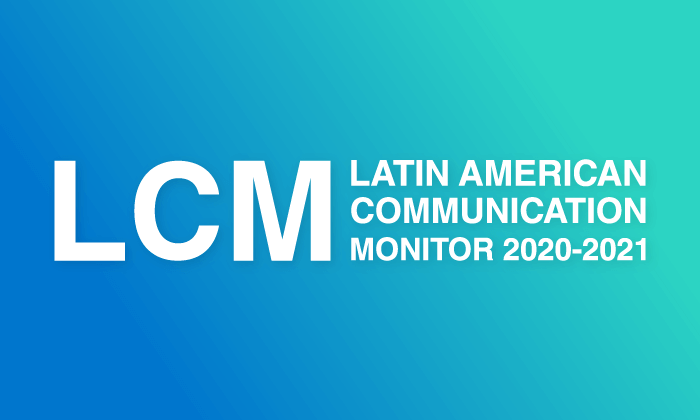Latin-American Communication Monitor 2020-2021: preliminary results (report & video)

47% of Latin-American communicators have experienced several ethical challenges in their daily work over the past year
The two main ethical concerns of communicators are: (1) the use of bots to generate responses and follow them in social media and (2) the hacking of personal data of the public using big data analysis.
The countries that report major ethical challenges are Brazil, Peru, El Salvador, Argentina, and Uruguay.
Latin America, December 2020 – Researchers from the Latin American Communication Monitor (LCM 2020-2021) study presented exclusively, within the framework of the EUPRERA autumn sessions, a preview on the results obtained in the fourth edition of the multinational study on communication management in the region (webinar recording available here).
During the session Juan-Carlos Molleda and Marco V. Herrera, researchers in the Latin American region presented the main findings on communication management issues and their relationships with cyber security, the status of women, ethical challenges, and new skills needed and concerns faced by of communicators in the region.
Puerto Rico and Cuba joined the study, having obtained data from 20 countries for the first time. The number of surveys answered also increased, from 1,165 to 1,683 responses. LCM continues to be the most representative study of the perceptions of communication professionals in the region, and where the opinions of professionals from different positions, experiences, and types of organizations are included.
The main growth of the sample was generated by the participation of communicators from large companies that are listed on the stock market and also from freelancers. In other demographics, the study reports that three out of four responses are from women; a drop in the levels of affiliation to professional associations was also detected.
Early findings
In the segment dedicated to ethical challenges and resources for integrity management, the study reported that 47% of Latin American communicators have experienced several ethical challenges in their daily work over the past year, and the two main ethical concerns of communicators are: the use of bots to generate responses and follow them in social media, and the exploitation of personal data of the public using big data analysis. The countries that report major ethical challenges are Brazil, Peru, El Salvador, Argentina, and Uruguay.
In the management of integrity and ethical challenges communicators use the ethical guidelines of their organizations 88% and personal values 89% are the preferred resources (the guides of professional associations only represent 79%). Communicators in joint-stock companies are the ones who use ethical codes the most.
Regarding the issue of cyber security, 75% of professionals believe that the issue is relevant to their daily work. Four out of 10 professionals have experienced cyber attacks or incidents of data theft in their own organization, and the most important concern of communicators from all sectors is possible criminal attacks on their online platforms and digital infrastructure 62% (overall)
On the important issue of gender equity at work: this study reports that in 64% of communication departments and agencies, the majority of professionals are women, but only one in two reaches managerial positions. It was also found that gender equality has improved significantly in Chile, Peru, and Venezuela; however, it was also found that more actions are necessary to improve in Argentina, Brazil, El Salvador, and Panama.
For professionals in the region, the most important strategic issues for communication management projected towards 2023 are: coping with the digital evolution and the social web; use big data and / or algorithms for communication; and explore new ways to create and distribute content. Regarding the Importance of communication channels and instruments today and in the future, communicators believe that mobile communication is advancing rapidly. Regarding relations with traditional media, participants believe that they are in recession.
Regarding the Competency development in the communication profession, the study reports that four out of five professionals in Latin America believe that constant improvement is necessary.
At the end of the session, the report on excellency in communication was presented, the study reports that only 23% of the communication departments of companies can be considered as an excellent communication department.


















